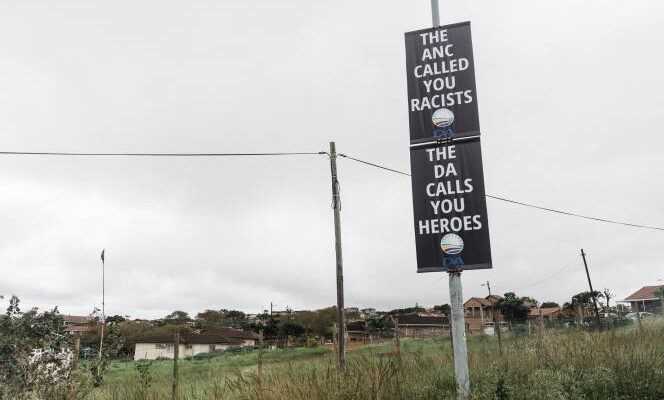Phoenix, about 25 km north of Durban, in Kwazulu-Natal: 180,000 inhabitants, mostly of Indian origin. On the hill opposite, Inanda, a black township. The place has everything of a small quiet town in South Africa: its middle class, its shopping center, its places of prayer. If only here, three months ago, around thirty black men were brutally killed in the worst violence that the young democracy has known.
In July, a week of riots and looting triggered by the incarceration of former President Jacob Zuma inflamed the province and Johannesburg. The televisions then show in a loop angry hordes, composed mainly of blacks, robbing shopping centers. The police are overwhelmed. More than 350 people are killed in the country.
In Phoenix, the inhabitants take up arms to defend their houses and their shops: 36 people are killed in the street. Among them, 33 black men. Some were shot in the head, others were beaten to death. Sometimes both. About 50 people have been arrested for murder, police said. Nine in the neighborhood of a resident of Indian origin, met by AFP, who wishes to remain anonymous. Her father is among them, someone gave her name, she said.
Denunciations, suspicions, indignation
Three months later, the denunciations, the suspicion continue. And the tensions between the two communities, a few days before local elections in South Africa, are still palpable. The historic ruling party, the African National Congress (ANC), has been accused of inaction. In the city, self-defense patrols continue to roam the streets at night.
South Africa will elect councilors for more than 250 municipalities on Monday, October 25. Earlier this month, the leading opposition party, the Democratic Alliance (DA), sparked outrage by hailing campaign posters on “Hero” at the origin of what is now called “The Phoenix massacre”. “They want our votes, but where were they all during the riots? “, launches the young woman from Phoenix. Defending herself from being racist, she enumerates her black friends, a black neighbor … The Indians simply sought to “Protect the community”, she says.
In the previous days, alarming messages on social networks had stirred the spirits: “They will attack your houses, set them on fire. “ Hundreds of businesses were set on fire during the violence. Until now, the two communities have coexisted without too many clashes. “Cars are carjacked, houses are broken into. But no, I had never seen that before », says Mark Nadasen, private security officer. South Africa is one of the most violent countries in the world.
“I can’t stand being near an Indian anymore”
In her modest Inanda kitchen with a battered buffet containing only a fillet of onions and a bottle of oil, Charmaine Mhlongo holds a portrait of her boy. “I can’t stand being near an Indian anymore”, loose the 39-year-old black woman. On July 12, she lost a son, 19-year-old Sanele Mngomezulu. Who killed him ? ” Indians “she said abruptly.
Township residents say during violent days Indians screamed in the streets “Let’s kill the Africans! Let’s kill the “cafres”! “, pulling from the dark archives of apartheid a highly insulting term used by the far right to refer to blacks. In the racial order of the white regime ousted by the first democratic elections in 1994, the mestizos and the Indians, gathered under the name of “Colored”, came before the blacks. “We were made third class citizens while Indians were considered second class citizens”, summarizes Pastor Vusi Dube, who buried several victims in Inanda.
In Phoenix, where Gandhi, a young lawyer from India, developed his doctrine of non-violence, many blacks are now employed by Indians in their businesses or as servants. According to some, the fury that gripped the city a few months ago was politically guided. “People wanted it to happen”, explain men from the Indian community. No one dares to give his name.
To stay up to date on African news, subscribe to the “Monde Afrique” newsletter from this link. Every Saturday at 6 a.m., find a week of current events and debates treated by the editorial staff of World Africa.
